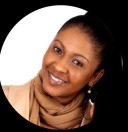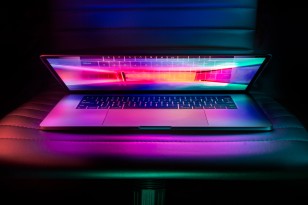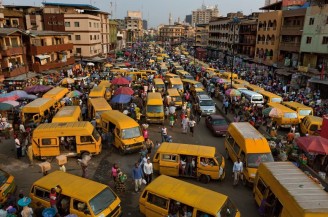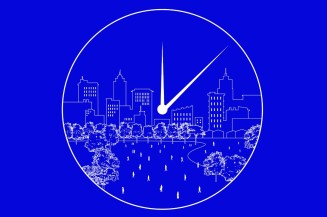Blog / Leadership & Transformation
How to apply a digital transformation strategy in finance and banking?
Categories

Beatrice Dikobe, alumnus of our Global MBA in Digital Transformation, is a leader with an ambitious mission: to contribute to the democratization of finance and banking in South Africa. She talked to us about how she is materializing this aim, how a digital transformation strategy is changing her work, the key takeaways she got from our MBA, and other precious details about her childhood and upbringing.
"Africa is a continent where digital opportunities are endless".
So reads the opening sentence of the final thesis that Beatrice Dikobe submitted in May 2021, after a year of hard work in the Global MBA of Digital Business program.
From growing up in a village where most people had no access to banking or other services, to becoming the Senior Product Manager of Fintech at the ninth largest mobile network operator in the world - and the largest in Africa - Beatrice's journey is a living testament to what can be achieved with dedication and hard work, creating opportunities for oneself and believing in education.
And it’s also a lesson on how to implement a successful digital transformation strategy in the finance & banking sector, in a growing segment (Mobile Money), and in a challenging, yet promising, context.
Beatrice, thank you very much for granting us this interview. We would like to start with this very ambitious project where you are now involved: MTN Group's Mobile Money. Could you tell us a little bit about your work and your main professional motivations?
My focus area in the team is creating value propositions for businesses, government and NGOs, as well as building the mobile money platform that suits their digital transactions needs.
The Fourth Industrial Revolution and Covid-19 made digitization of transactions a necessity for a lot of businesses. What customers need is a solution to an existing problem. For example, NGOs to disburse funds and collect crowdfunding; FMCG’s/retailers/wholesalers to collect payments and pay salaries, suppliers and bills; government to collect taxes and fees for services, etc.
In digitizing their transactions, our business customers want to solve issues associated with robberies and fraud, cash flow, their beneficiaries’ access to digital banking, etc. and it gives me such pleasure to be in a position to provide a solution. What I do in my job allows me to be at the center of the democratization of finance and technology, and that motivates me.
MTN recorded a 28% jump in mobile money transactions per minute across all its African markets in the first half of 2020. Where do you see the things evolving from here for the users and for MoMo?
We always work hard to increase our mobile money market share and usage. It only makes sense to expand our footprint into other markets; deliver customer-centric products and services with automated end-to-end customer journeys, backed by data, cloud, IoT, IA, and ML technologies. It will require a strong network and customer migration from feature phones to smart devices.
Looking at your curriculum and how you have built and are building your career, we can say that you’re a real go-getter. Was it always part of your plan to become a leader?
Thank you. I don’t think I consciously set out to become a leader. When my parents put all their savings into my tertiary education, putting their dreams on hold, I knew a lot was riding on my success, and I could not afford to fail.
I’ve always believed that I can achieve the goals I set for myself. Every time I achieve a goal, I set the next one a little bit higher. I’ve worked hard on my career because of all the aspects of my life, my career is one of the few parts I have 100% control over. All these and more led me to become a leader, and it’s a role I embrace wholeheartedly by improving myself and mentoring those who are still starting their careers.
What does your hometown and where you’re from mean to you? How has it shaped you?
My upbringing was basic and we were self-sufficient. I grew up in a poverty-stricken village at a time when South Africa had a segregation policy. We had no services and so my community survived on subsistence farming, fetching water from the river and wood for the fire from the bush. As a little girl, I tended to the goats.
Almost every family had migrant laborers and my aunts on both my paternal and maternal sides worked as housekeepers in Johannesburg. I would visit them during school holidays and it's from there where I knew as a child that there is more to life and that when the time comes, I need to go out there and demand more from life. My community and family are determined survivors who made things happen with the bare minimum and because of that, I can survive anywhere. I always draw strength from that.
In your MBA motivation letter, you explained you grew up in a village where most people did not have access to banking and that was where your passion for the digitized world originated. So, from your perspective, how has a digital transformation strategy managed to make banking and other services more inclusive in Africa over the past decades?
According to the GSMA Mobile Economy report, 477 million people in Sub-Saharan Africa subscribed to mobile services in 2019, accounting for 45% of the population. This means that 477million people have at least one handset and an MSISDN number. In Fintech, the MSISDN number doubles as a bank account known in Fintech as a wallet and allows the wallet holder to transact digitally. Fintech enables us to make banking and technology accessible to everyone.
Apart from the application of a digital transformation strategy, what have been the biggest lessons from the MBA program?
The technology now available to us and how to use it to grow faster than before. ML, AI, Cloud, IoT, data mining and the best tools available, etc. I’m in product management and, before this MBA, I used to be aware of these technologies but never aware of how to apply them in Fintech. Now, I’m able to identify our technology strengths and where we fall short, and also identify potential partnerships.
“ML, AI, Cloud, IoT, data mining: before this MBA, I was aware of these technologies but didn’t know how to apply them in Fintech. Now, I’m able to identify our technology strengths and where we fall short, and also identify potential partnerships”
What have been the make-or-break moments in your career? What did you learn from them?
I’ve always known when to make a move or when to stay longer and contribute my skills. I've learned to grab opportunities afforded to me and use them to grow my career, as most opportunities come once in a lifetime. We don’t usually get employers paying for 100% of study fees, so when I was employed by one I made sure to study further.
What are the qualities you believe the company should look for when hiring and that the candidates should develop?
In this digital era, HR should look for individuals that do not conform to the norm, individuals that are innovative with bold ideas and give them space to be innovative and grow. One of the ways to identify these people is via assessment tests and solution presentation during the interview stage. Companies should encourage innovation by rewarding it.
“HR should look for individuals that do not conform to the norm, that are innovative with bold ideas, giving them space to be innovative and grow”
What’s a leadership lesson that you’ve learned that’s unique to being a female leader?
Few… As a woman leader, you have to work harder than your male counterparts to be recognized and change has been slow in some of the companies I’ve worked for. The boardrooms can be male-dominated but femininity can be a strength. Women need not morph into men or adopt masculinity to get ahead.
What are some of the actions a company can make to be more inclusive at all levels?
Since the beginning of 2020, our focus and that of many companies have had to change as a lot was changing around us because of Covid-19. A lot of support has been provided by my employer to work flexible hours and from anywhere, by providing bursaries to study, employee and family support for mental health, etc. and these opportunities have come in handy during these difficult times. Especially for women who work and physically take care of their families. This has proven to beworking as employees are now more productive. I think more companies can copy this working model.
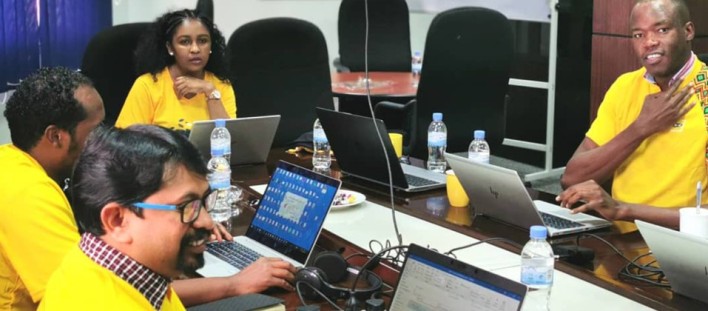
Mobile Money: Beatrice working on a MoMoBusiness project in Ghana.
Do you have any idols or people who inspire you?
My parents. They dared to break the cycle of poverty that still cripples many by working hard and investing in my education. I’m the first in both my paternal and maternal family to attain a bachelor’s degree. All their dreams and hopes were invested in my education. A lot of what I know and now apply, I learned by just watching them through life. They were both leaders in their own right, giving of themselves and their possessions. I have a younger sister, but I don’t remember a time when it was just the four of us at home. Their hard work, selflessness, integrity, fearlessness, and love, etc. are all values I live by and am currently passing them on to my daughter.
My parents are my idols (…) They dared to break the cycle of poverty that still cripples many by working hard and investing in my education. I’m the first in both my paternal and maternal family to attain a bachelor’s degree”
Are you interested in transforming all levels of your business?
The Global MBA in Digital Transformation has been designed for professionals who want to foster their technological and decision-making skills and add a differential value to increase their competitiveness in the global market.

